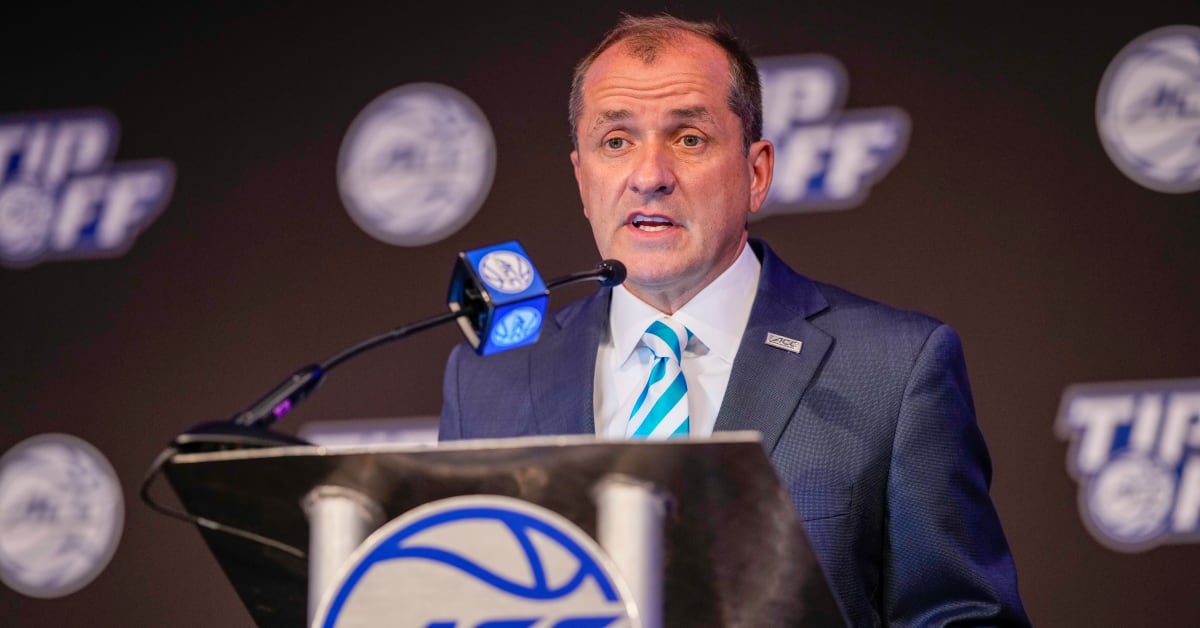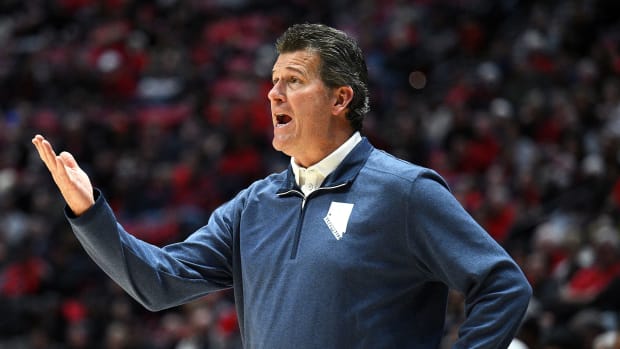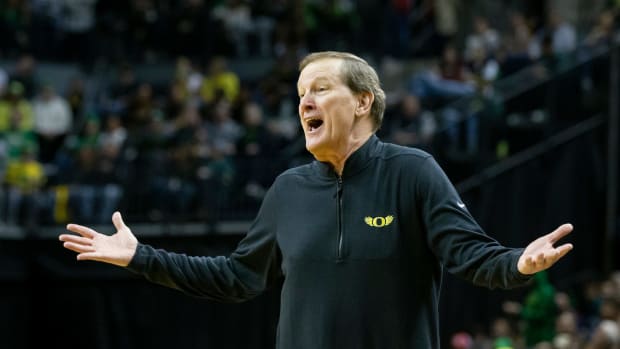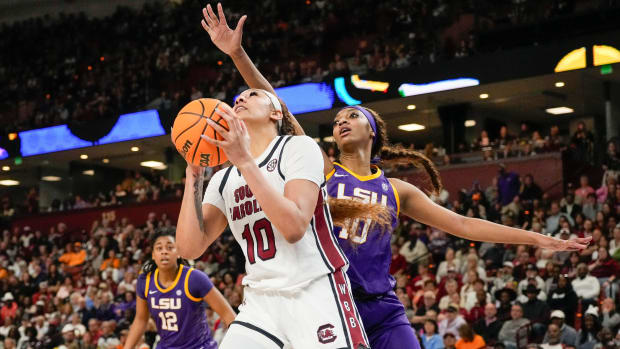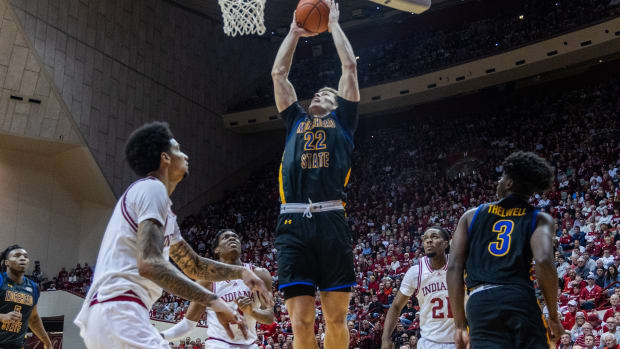ACC on Verge of Splintering Because of Every-School-For-Itself Approach
As speculation and rank rumor roiled outside the meeting rooms of the Ritz-Carlton in Amelia Island, Fla., this week, there was discussion among Atlantic Coast Conference leaders about doing what comes naturally amid realignment drama: putting out a statement of unity among the league members.
The ACC punted on that idea, a small triumph for honesty in an inherently dishonest process.
“We’re not unified,” is how one ACC source explains it. “We’re unified until someone offers a school more to go somewhere else. Everyone is going to grab it.”
This is your current ACC status: situationally and temporarily unified, with all parties trying to make the best of the current arrangement while eyeing the exit doors. At least they’re upfront about it.
In the every-school-for-itself world of college athletics, where there is no such thing as enough money, the ACC and Pac-12 currently are embroiled in bicoastal uncertainty. The Pac-12’s situation has been more public, having already been plundered by the Big Ten with the soon-to-be exodus of USC and UCLA and trying to now keep the rest of its 10-school cohort intact. The ACC’s instability has been percolating for quite some time before fully bubbling to the surface this week in what could be described as a high-stakes, seven-on-seven scrimmage.
Sports Illustrated reported Monday that half the 14 football-playing ACC schools had met in various combinations to discuss potential exit strategies for richer pastures. The seven with the wandering eye: Clemson, Florida State, Miami, North Carolina, NC State, Virginia and Virginia Tech. The seven on the other side: Boston College, Duke, Georgia Tech, Louisville, Pittsburgh, Syracuse and Wake Forest.

ACC commissioner Jim Phillips remains optimistic around the future of the league.
Jim Dedmon/USA TODAY Sports
Lawyers for the potential Wandering Seven had examined the league’s grant of rights agreement, which runs through 2036, looking for loopholes. Locked into a long-term ESPN contract that stagnates revenue growth, they either want out or want a path to increased cash. Clemson and Florida State had made the most noise about it publicly, but this week we learned how much company they have.
The seven-on-seven split apparently came as news to some of the league members, which made for some interesting meeting room dynamics Monday. In comments to the Richmond Times-Dispatch, Virginia Tech athletic director Whit Babcock used the words “blindsided” and “shock” for those who were uninformed, adding, “These jobs are hard enough without something knocking you upside the head.”
The positive fallout from this blindsiding: It got everyone’s agenda out in the open and led to what all parties described as candid conversations. Everyone in the ACC should have exited Amelia Island with a whole lot less guesswork about where their colleagues stand.
Particularly, these meetings helped clear a path toward uneven revenue distribution. That sounds ominous in terms of conference harmony, but a performance-based shift away from equal slices of the revenue pie is workable. If your school succeeds at a College Football Playoff level in football and the NCAA tournament level in men’s basketball, it makes more money than those who do not.
That’s an easier way to build a consensus than by declaring that the most TV-friendly brands should get bigger shares. Winning your way to more money seems like a merit-based concept most schools can get behind.
“This provided some urgency to speed up conversations about the way we do revenue sharing,” an ACC source says. “If you set expectations and people know what the rules are, nobody can say it’s unfair.”
How much money are we talking about? Maybe $10 million a year for the high achievers in football. That’s not insignificant, of course, especially in a time of name, image and likeness payouts for players and increased outlays for athlete-first things, like mental health, nutrition and academic support. But it’s also not enough to eliminate the chasm between what the Big Ten and SEC will soon be making and what the ACC schools continue to make within their endless ESPN contract.
Commissioner Jim Phillips has been tasked with fixing something that looks damn near unfixable. (And which he inherited from former commissioner John Swofford.) While looking for creative solutions, Phillips is also trying to remind his membership that money isn’t everything when it comes to competitive excellence.
“I feel really good about the future of the ACC, I do,” he said Wednesday. “We’ve got to close that gap, for sure. But at the end of the day, how much [revenue] do you need to be a national champion in football or basketball and our other sports? Do you have to be at the top level? Do you have to spend the most to be the best? I don’t know that there has been an equation that has connected the two. It’s certainly helpful and it certainly allows you a better chance.”
The two schools that might not be listening to that message are the two that have dominated the conference in football for the last decade-plus: Clemson and Florida State. They’ve combined to win 11 of the past 12 ACC titles and three national championships in that time (two for the Tigers, one for the Seminoles). Those two, along with Miami, are the bedrock football schools in the league and could simply be an SEC invitation away from challenging that ACC grant of rights.
If it comes to that, there are two potential outcomes: The schools risk financial ruin to get out of the league and fail in what assuredly would be a massive legal battle or they win and the fault lines split the ACC in half. The league diaspora would be scooped up by the Big Ten, SEC and likely the Big 12, with perhaps a Big East football reincarnation that brings the northeast schools back together. In short, all hell would break loose.
That’s why the stakes in this ACC seven-on-seven scrimmage are so high. At least now, after some honest exchanges at a beach resort in Florida, everyone in the league knows where they stand and where their brethren stand. Situationally and temporarily unified.
Richard Johnson contributed reporting.
